|
|
|
Sort Order |
|
|
|
Items / Page
|
|
|
|
|
|
|
| Srl | Item |
| 1 |
ID:
071927
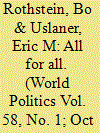

|
|
|
|
|
| Publication |
2005.
|
| Summary/Abstract |
The importance of social trust has become widely accepted in the social sciences. A number of explanations have been put forward for the stark variation in social trust among countries. Among these, participation in voluntary associations received most attention. Yet there is scant evidence that participation can lead to trust. In this article, the authors examine a variable that has not gotten the attention it deserves in the discussion about the sources of generalized trust, namely, equality. They conceptualize equality along two dimensions: economic equality and equality of opportunity. The omission of both these dimensions of equality in the social capital literature is peculiar for several reasons. First, it is obvious that the countries that score highest on social trust also rank highest on economic equality, namely, the Nordic countries, the Netherlands, and Canada. Second, these countries have put a lot of effort in creating equality of opportunity, not least in regard to their policies for public education, health care, labor market opportunities, and (more recently) gender equality. The argument for increasing social trust by reducing inequality has largely been ignored in the policy debates about social trust. Social capital research has to a large extent been used by several governments and policy organizations to send a message to people that the bad things in their society are caused by too little volunteering. The policy implications that follow from the authors' research is that the low levels of trust and social capital that plague many countries are caused by too little government action to reduce inequality. However, many countries with low levels of social trust and social capital may be stuck in what is known as a social trap. The logic of such a situation is the following. Social trust will not increase because massive social inequality prevails, but the public policies that could remedy this situation cannot be established precisely because there is a genuine lack of trust. This lack of trust concerns both "other people" and the government institutions that are needed to implement universal policies.
|
|
|
|
|
|
|
|
|
|
|
|
|
|
|
|
| 2 |
ID:
182762


|
|
|
|
|
| Summary/Abstract |
This paper investigates the impact of social trust on a firm's adjustment speed toward an optimal capital structure. Leveraging the availability of generalized trust and personalized trust metrics in China, we find that, as expected, when a firm is located in a high social trust region (with either generalized or personalized trust), it adjusts more quickly toward its target capital structure. Moreover, we document that the impact of generalized trust (personalized trust) on the adjustment speed is magnified if the firm already had stringent financial constraints (less-severe agency problems) but it is not related to the severity of a firm's agency problems (financial constraints). Additional analysis suggests that the impact of social trust on capital structure dynamics is primarily through debt rather than equity. Furthermore, we find that when a firm is located in a weak formal institutional environment, the impact of generalized trust on the adjustment speed strengthens, suggesting that formal institutions and generalized trust are partial substitutes. Interestingly, the substitution effect of formal institutions and personalized trust is weak. Hence, the impact of generalized trust and personalized trust on capital structure adjustment share some similarities but differ in other respects.
|
|
|
|
|
|
|
|
|
|
|
|
|
|
|
|
| 3 |
ID:
143401
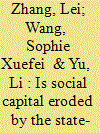

|
|
|
|
|
| Summary/Abstract |
In the rapid urbanization process, indigenous villagers' social capital might be affected by the flooding-in of rural migrants and more importantly by the government's urbanization policies. Based on survey data collected from fifteen Beijing villages in 2011 and 2012, we study the relationship between social capital and urbanization for indigenous villagers in the urban fringe of Beijing. We find that the bottom-up urbanization measured by migrant-local ratio weakened social networks and social trust. However, the top-down urbanization measured by designating policy zone promoted social networks and social trust.
|
|
|
|
|
|
|
|
|
|
|
|
|
|
|
|
| 4 |
ID:
083649
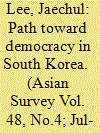

|
|
|
|
|
| Publication |
2008.
|
| Summary/Abstract |
This study examines whether social capital promotes democratic citizenship. It reveals that the structural component of social capital motivates the Korean masses to participate in the political process and to embrace the norms of democratic behavior, while its cultural component encourages them to appreciate the virtues of democracy
|
|
|
|
|
|
|
|
|
|
|
|
|
|
|
|
| 5 |
ID:
126577
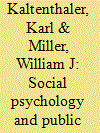

|
|
|
|
|
| Publication |
2013.
|
| Summary/Abstract |
This study argues that a central factor in the determinants of citizen attitudes toward trade is the social psychology of the individual in question. Namely, we contend that the level of social trust an individual has will condition the degree to which an individual wants to open her country to imports from other countries. Those individuals with lower relative levels of social trust are less likely to support the notion of freer trade. We base this contention on the logic that those people who are distrustful of people in general are more likely to distrust that which comes from people who are unknown to them, such as goods coming into their country from abroad. This argument is a departure from previous studies of public attitudes toward trade, which have focused on various economic utilitarian considerations and xenophobia that shape citizen attitudes toward trade liberalization. To test our argument, we employ data from the 1995-1997 wave of the World Values Survey. Using a logit regression analysis, we find, as predicted, that the more social trust an individual has, the more likely that person is to support the idea of liberalized trade.
|
|
|
|
|
|
|
|
|
|
|
|
|
|
|
|
| 6 |
ID:
182804
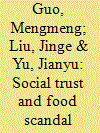

|
|
|
|
|
| Summary/Abstract |
Food safety problems are drawing increasing attention after the occurrence of repeated food scandals in China. The literature has found that social trust, a non-institutional factor, is an important factor in disciplining dishonest behaviour and improves the media's incentives to report. In this paper, we develop a model to investigate the dual effects of social trust—behaviour discipline effect and media enhancing effect—and analyse its interplay with institutional factors on food scandal exposure. The theory is then tested using 2004–2011 food event data. The results show that trust has a significant positive impact on food scandal exposure, which implies that the media enhancing effect plays a dominant role in China. However, this effect is weakened in provinces with a higher level of law enforcement and market development, which suggests that institutional factors are a substitute for social trust in affecting food scandal exposure in China.
|
|
|
|
|
|
|
|
|
|
|
|
|
|
|
|
| 7 |
ID:
187425
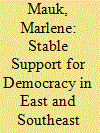

|
|
|
|
|
| Summary/Abstract |
Recent democratic regressions and crises suggest democracy is at risk across East and Southeast Asia. One of the factors that can determine democratic stability are citizens’ attitudes. While previous research has concentrated on support for democracy-in-principle, this contribution argues that it is political trust, i.e. support for democracy-in-practice, which is crucial for democratic stability. For democracies to be stable, political trust should be high as well as rooted in long-term factors like liberal democratic value orientations or social trust to protect it from short-term fluctuations following economic crises or political scandals. This contribution therefore examines not only the current levels and development of political trust but also whether it is influenced more by long-term factors (liberal democratic value orientations, social trust) or short-term factors (economic performance evaluations, incumbent support). The empirical analysis shows political trust in five East and Southeast Asian democracies (Indonesia, Japan, Mongolia, South Korea, Taiwan) to be mostly mediocre and primarily dependent on economic performance evaluations and incumbent support. Among the five democracies, citizens in Japan appear most resilient to democratic regressions; on the other hand, Taiwanese democracy seems least equipped to master future crises.
|
|
|
|
|
|
|
|
|
|
|
|
|
|
|
|
| 8 |
ID:
152120


|
|
|
|
|
| Summary/Abstract |
Under which circumstances do two democracies involved in a dispute decide to pursue binding conflict management? I argue that the existing literature is incomplete. In order to fully understand why democratic decision makers choose arbitration or adjudication over alternative strategies, it is necessary to consider the social trust levels of the general populations in both states. During arbitration and adjudication, states give up sovereignty in a crucial domain of foreign policy. This loss of control should be less problematic for high-trusting societies than their low-trusting counterparts. If citizens are generally optimistic about the behavior of strangers, they are more likely to place their country’s interests under the control of others. Furthermore, since the general population poses smaller constraints on decision makers in nondemocratic settings, I expect the effect of trust to be strongest in democratic dyads. An empirical analysis with a new data set of social trust provides support for this hypothesis.
|
|
|
|
|
|
|
|
|
|
|
|
|
|
|
|
|
|
|
|
|